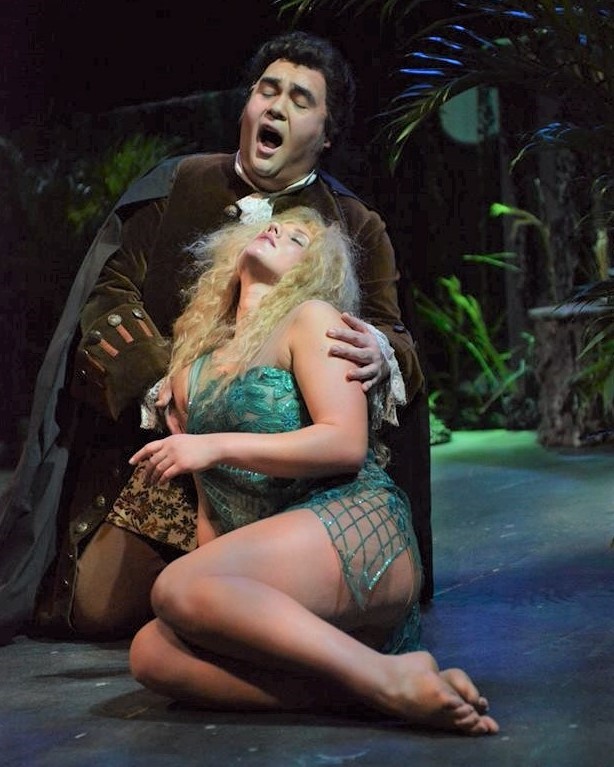
Rusalka by Antonin Dvorak, Academy of Vocal Arts, Philadelphia, January 31, 2019.
Rusalka at the Academy of Vocal Arts provided pleasant surprises.
Once each year, the AVA presents a fully-staged opera that’s not from the normal repertoire in performances with piano accompaniment. This fairy-tale by Dvorak concerns a water nymph who falls for a prince and wants to become a human being to experience love, so she has the witch Ježibaba transform her. When she finds that her lover is inconstant, she regrets her choice, and the opera has a tragic end.
As in the AVA’s earlier Rheingold and Pelléas et Mélisande, music director and coach Luke Housner led a vital performance from the keyboard. In fact, some harmonies and counter-melodies were more noticeable without an orchestral blanket draping over everything. Housner brought out all the fantasy, drama, charm and humor in Dvorak’s score — although I regret not being able to hear shimmering strings and, in the second act, plangent brass.
Even more of a surprise, Kara Mulder’s singing of the title role was a revelation. I had heard her only as the female lead in Puccini’s Le Villi in November 2018, and praised her for a “nice” performance. But that relatively ordinary role in the composer’s first opera did not prepare me for what we heard here. Mulder displayed a colorful voice with great strength in the middle, plus soaring high notes. My expectations were muted, also, because of a review in another publication of the production’s opening night that claimed Mulder’s voice “lacked float.” Clearly, that critic and I attended different performances and heard different things.
Mulder’s “Song to the Moon” was ethereal, and her laments in the middle of Act II and at the start of Act III were passionately involving. She made us realize the vocal possibilities of the role, eclipsing the thinner, lighter renditions in the Metropolitan’s recent Rusalka productions (1997 and 2014 with the sweet-voiced Renée Fleming, 2017 with the cool lyric Kristine Opolais). Mulder showed us that a standard Puccini voice is not sufficient for this multifaceted heroine. Zinka Milanov demonstrated how good a larger, darker voice can sound in this music with her 1958 recording of the Moon aria, but that Croatian soprano never sang the complete role.
Another surprise was the lush forest stage setting and nicely detailed direction by K. James McDowell. It created more atmosphere than the usually small, basic sets of other AVA productions. He’s the artistic director of the Academy and normally hires outsiders for these tasks. Additional directorial touches were added by Housner and the cast, such as the enactment of fantasy visions by the central character.
Not so surprising was the excellence of tenor John Matthew Myers as the Prince who loves and then betrays Rusalka. He has progressed nicely in his three years at AVA, as we witnessed when he was a superb Bacchus in Ariadne auf Naxos. He has heldentenor quality, and also an exceptionally warm intimacy and vulnerability. In the final scene, as he dies in Rusalka’s arms, we heard a lovely crooning delivery which reminded me of his sound as Eisenstein in Fledermaus by Concert Operetta Theater in 2015 when I first saw him perform.
Mezzo-soprano Alice Chung was powerful as the sorceress Ježibaba, and bass Eric Delagrange made a striking water gnome Vodnik. Solid contributions came from baritone Anthony Whitson-Martini as the Gamekeeper and mezzo-soprano Pascale Spinney as his nephew. Their talents are unmistakable even though their roles here are peripheral. Soprano Claire de Monteil made a fine contribution as the Foreign Princess and, among the water sprites, the rich mezzo voice of Gabriela Flores stood out.
A shorter version of this review was originally published in the international publication for professionals, The Opera Critic.